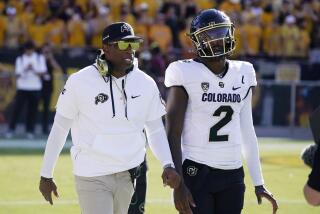School’s Actions Are Key to Suit
- Share via
Legal experts say Linda Will, the mother of Rashidi Wheeler, has a good chance of winning a negligence lawsuit against Northwestern if her attorneys can show that university employees acted unreasonably when the Wildcat football player died Aug. 3 after collapsing during an on-campus conditioning drill.
“They would have to show that Northwestern failed to take reasonable care [of Wheeler], which is to say, failed to do what an ordinary, prudent person would do in a similar circumstance,” said Jennifer Arlen, a visiting professor at Yale Law School and a staff member at USC.
On the other side, Arlen said, Northwestern will try to show that athletic trainers acted reasonably in treating Wheeler, and that the player assumed risk by voluntarily participating in the drill, knowing he was a chronic asthmatic. The Cook County (Ill.) medical examiner cited the cause of death as exercise-induced bronchial asthma.
“Northwestern would likely claim, No. 1, this is not negligence, we do not have a duty to have X number of trainers or medical personnel present,” Arlen said. “No. 2, you assume the risk by entering into it knowing the circumstances. You know your [medical] condition.”
Experts said there are several points that could prove problematic for Northwestern and prompt the university to settle the case out of court:
An apparent misdiagnosis of hyperventilation by an assistant trainer, who gave Wheeler a bag to breathe in when, in fact, Wheeler was gasping for air because of an asthma attack.
Claims that the drill, which caused several other Northwestern players to collapse of exhaustion, was inadequately staffed and had an inadequate emergency plan.
Reported delays in calling paramedics and a transcript of disjointed 911 calls that might have further delayed the arrival of emergency medical personnel.
James E. Fox, a Sherman Oaks attorney who specializes in civil litigation involving catastrophic death and injury, said he believes Will has a “winnable” case.
“The most striking aspect of this negligence claim was the misperception of [Wheeler’s] gasping for air as an episode of hyperventilation,” said Fox, citing an Evanston police report. “By putting that bag over his head, basically [trainers] were depriving him of oxygen, which is very dangerous in an asthmatic who’s gasping for oxygen.
“It’s the equivalent of pouring gasoline on the fire; like putting a bag over the head of a drowning victim.”
Fox said proving the misdiagnosis could provide an important link between the claim of negligence and the cause of death.
“The fact that there was improper staffing, or understaffing, may or may not have had anything to do with [Wheeler’s] death,” he said. “It seems to me, if there is a cardiorespiratory death, the act of a trainer further depriving [Wheeler] of oxygen does provide that link.”
Arlen, the Yale and USC professor, agreed that the misdiagnosis could prove damaging for Northwestern, especially because trainers should have known Wheeler had asthma. Head trainer Tory Aggeler said Wheeler, a 22-year-old safety from Ontario, suffered more than 30 asthma attacks at the university.
“If [trainers] knew he was an asthmatic, then they may be on more problematic ground by treating him with a bag as if he were hyperventilating,” Arlen said. “There is his inhaler. You would expect [trainers] to give him that instead.”
Said Fox: “The medical history of these kids seems to be very important. I would think, at the very least, the field staff needs to know which of those kids are at risk, and needs to be mindful of that in supervising these drills.”
Fox said Northwestern will claim trainers acted reasonably under the circumstances.
“They had to make a quick judgment, and their judgment was that [Wheeler] was hyperventilating,” he said. “Northwestern will contend it was a reasonable judgment. They’ll say, ‘In hindsight, we made a mistake, but the trainers should not be judged with the benefit of hindsight, but based on their conduct as the events were occurring.’ ”
Fox said Northwestern probably will try to show that its staffing and level of care at the conditioning drill met acceptable standards, comparable to other NCAA Division I-A football programs.
Northwestern Coach Randy Walker, who was prohibited by NCAA rules from attending the workout, said six trainers, strength coach Larry Lilja and another strength coach were monitoring the drill, which consisted of running 28 sprints ranging from 100 to 40 yards. Will claims fewer personnel were present.
Named as defendants in the lawsuit were Walker, Athletic Director Rick Taylor, Aggeler, Lilja, assistant coach Thomas Christian, coordinator of football operations Justin Chabot and trainer intern Michael Rose.
Will’s attorneys are “going to have to find a coach and a trainer who can get on the witness stand and point the finger and tell what was wrong,” Fox said. “But that might be difficult because this may be a case of business as usual. The bar may be too low. It may be that all the universities have to clean up their acts.”
Said Arlen, “Northwestern will say this is what everyone does, and in most circumstances this is totally fine. This is reasonable. And even if it wasn’t reasonable, [Wheeler] knew it too and [was] willing to encounter this risk.”
Still, the stakes are high for Northwestern, Fox said. With individual employees being named in the suit, Fox said the university might be compelled to offer a settlement.
If Northwestern goes to trial and loses, individual defendants “could be looking at judgments against them that would probably exceed any of their own personal assets,” Fox said. “It seems to me, therefore, the individual defendants would put a lot of pressure on the university to bail them out without risking a judgment against them.
“However, the university might draw a line in the sand and say, ‘Hey, we can’t be responsible for every medical emergency on campus.’ ”
Most civil litigation is settled out of court, and Fox believes that could happen in this case if both sides are reasonable.
“If they go to trial, a lot can happen,” he said. “The university could win and end up paying nothing, or the parents could win and end up winning $5 or $10 million. There are lots of risks on both sides in going to trial and allowing a jury to decide fault and damages.”
A key point in deciding damages, Fox said, would be lost future earnings by Wheeler, a safety who was projected as a potential NFL draft pick.
“When Rashidi died, enormous economic potential was lost,” said Randy Schwartz, an attorney in the Chicago-based firm that includes Johnnie Cochran Jr. and Jim Montgomery, who are representing Will.
While Schwartz said he and his fellow attorneys have not determined a specific amount of damages they would seek, either in a jury trial or from a settlement, he surmised, “It’s going to be on the high end.”
The Rev. Jesse Jackson, who is serving as spokesman for Wheeler’s family, has said the suit against Northwestern will focus on what he called the delay from the moment Wheeler collapsed to the time the player was treated by Evanston paramedics.
Players who witnessed Wheeler’s collapse said trainers delayed calling paramedics because they were uncertain of the severity of his condition.
Fox said it could be difficult to prove that trainers were negligent in not calling sooner for paramedics.
“[Will’s attorneys] will have to find a physician to testify that, let’s say, if paramedics were there five minutes earlier, there is a likelihood that [Wheeler] could have been saved,” Fox said. “At what point did [Wheeler] arrest? This is critical.”
Will’s attorneys also are likely to point to the 911 tapes, which show that it took more than three minutes after the first call was made before an ambulance and fire truck were dispatched. The first cell phone call, made by Aggeler, disconnected. A cell phone had to be located because a field phone was inoperable.
“Certainly [the trainers] should be capable of bringing in emergency medical personnel in a reasonable amount of time,” Fox said. “They should not be yelling at each other to find a cell phone to make a 911 call.”
Another factor is that Wheeler was found to have the banned stimulant ephedrine in his system when he died. Although medical experts say mixing intense exercise and ephedrine--contained in a one or more dietary supplements Wheeler took before running the sprint drill--can have potentially dangerous side effects, neither Fox nor Arlen thought it would be a critical issue to either side in this case. Supplement makers were not included in the suit.
“Whatever the cause was, whether the ephedrine contributed to [Wheeler’s] problems at the time or not, the training staff had to deal with it,” Fox said.
Said Arlen, “I don’t know how [ephedrine] played into it. If Northwestern knew he had taken [supplements], it could cut both ways. That will be where the argument goes.”
Finally, Fox said Northwestern’s best defense could be a simple one.
“The university defends this case by saying, ‘Look, kids have asthma attacks and a certain percentage of the population doesn’t survive these attacks. There’s nothing we could have done to alter the course. [Wheeler] knew he had asthma and he elected to play the game.’ ”
Northwestern is represented by the law firm of Kelley, Drye and Warren, which has 12 offices throughout the nation, including one in Los Angeles. Attempts to reach a spokesman for the firm were unsuccessful.
*
Times staff writer Lance Pugmire contributed to this report.
More to Read
Fight on! Are you a true Trojans fan?
Get our Times of Troy newsletter for USC insights, news and much more.
You may occasionally receive promotional content from the Los Angeles Times.





